RTI International (Research Triangle Institute) is a non-profit research institute based in North Carolina that provides research services for government and commercial clients around the globe. RTI became an ORCID member organization in 2017 through LYRASIS, which then became the ORCID US Community consortium in 2018. This blog post is based on a presentation by Bonnie Crotty Nelson, Senior Information Services Specialist at RTI, for the ORCID US Community Showcase Webinar #7 on February 2, 2022. Many thanks to Bonnie for sharing her experience!
RTI’s mission is to improve the human experience through scientific research, so it is no surprise that they are also working to improve the experiences of their researchers and staff by incorporating persistent identifiers into the RTI research cycle as much as possible. ORCID adoption has been a priority at the institute, with ORCID iDs increasingly required by publishers and clients. Additionally, ORCID helps with disambiguation of common names while providing a way for researchers and staff to spend less time on the administrative burden of tracking and sharing information about researchers and research across stakeholder groups and platforms.
With this value proposition in mind, staff in the Scientific Stature Hub (SSH) department at RTI, a collaboration of library services and scholarly publishing at the institute working to improve internal knowledge management, activated the ORCID member API integration available within Elsevier’s Pure current research information system (CRIS), which RTI was already using as a metadata repository for keeping track of research activity. Pure allows researchers to connect their authenticated ORCID iD with their CRIS profile, import data from their ORCID record, and send employment and works information from Pure to their ORCID record.
After activating the ORCID integration, the SSH team soon realized that targeted outreach to RTI researchers would be needed to raise awareness about the new ORCID functionality so that the researchers and the organization as a whole could benefit. In April 2020, SSH staff gained internal stakeholder support from senior management and the RTI Fellows Scientific Stature Committee to pursue an outreach initiative to encourage RTI research staff to obtain ORCID iDs and link them to Pure.
RTI’s initial ORCID outreach campaign included giveaways, promotional tables in the cafeteria, and in-person training. When the Covid-19 pandemic hit, they moved to an online campaign using emails, prize drawings, and numerous blogs and articles. Initially, only about 12% of RTI’s researchers linked their ORCID iD to their profile in Pure. A goal was set to get 50% of researchers’ ORCID iDs connected by the end of the 2020 calendar year. To reach this goal, RTI SSH staff focused on spreading general awareness and training about the effort. Internal RTI business units were provided with statistics and percentages of how many of their researchers were connecting their ORCID iDs in relation to the other business units, to foster a sense of competitive motivation. All of the RTI business units are heavily vested in having a high percentage of published authors, and connected ORCID iDs have helped to track and promote the works of those authors. By the end of 2021, 68% of RTI researchers had connected their ORCID iDs. As of 2022, a new goal has been set to reach 80% adoption.

RTI staff launched an outreach campaign to encourage researchers across the organization to register for an ORCID iD and connect it to RTI’s current research information system (CRIS).
Researchers who connect their ORCID iD to RTI’s CRIS system benefit by having their ORCID records automatically populated with their RTI employment affiliation and their works, including peer reviewed publications, conference materials, and technical reports. Library staff populate researchers’ Pure records with all of their indexed peer reviewed journal articles from databases such as PubMed, which then get exported over to their ORCID profile. All the information is validated and curated before being sent to ORCID, to ensure that public ORCID data is clean and correct, so researchers can use their ORCID record as an authoritative central place to keep track of all of their affiliations and activities while at the same time benefiting from the interoperability (reading and writing of data between multiple systems) that ORCID provides.
The user experience for connecting an ORCID iD to Pure works as follows:
Researchers are encouraged to “create or connect” their ORCID iD with Pure by clicking an ORCID-branded button on their Pure profile:
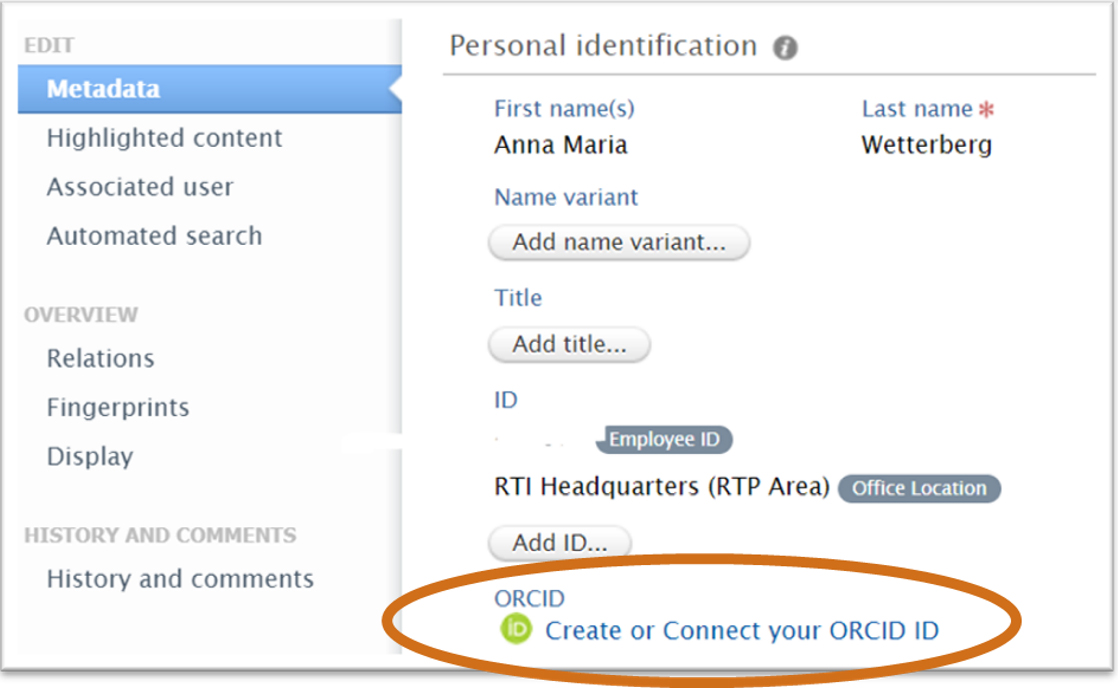
The system provides an explanation about what will happen once the researcher connects their ORCID iD:
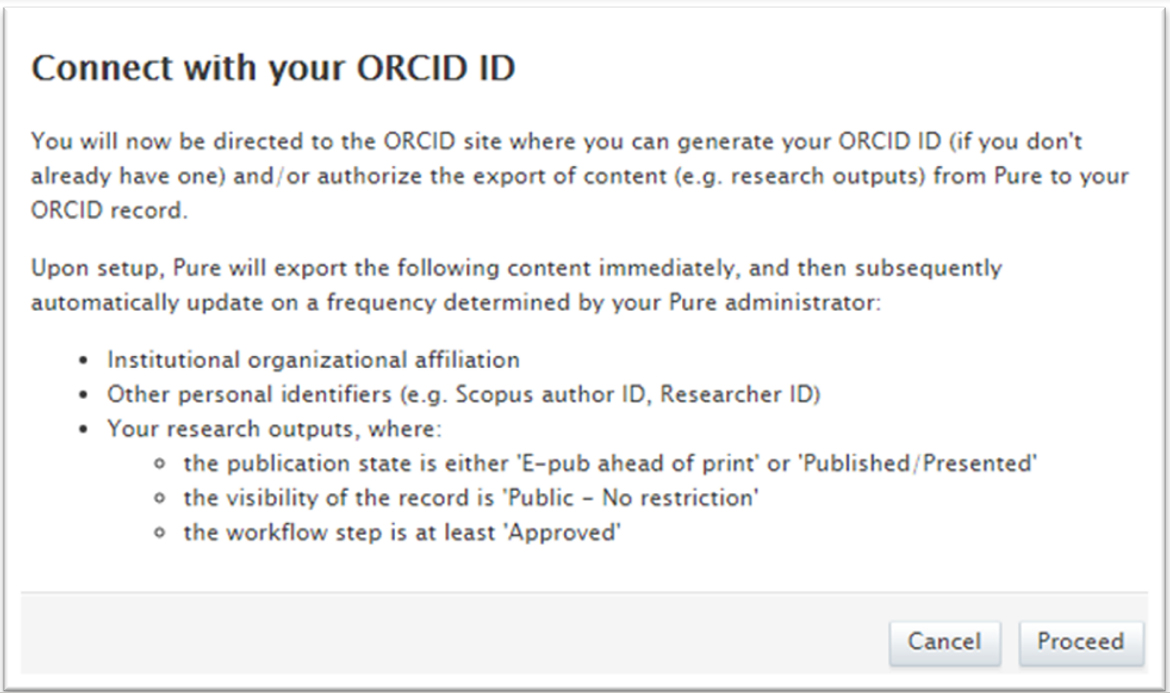
Upon clicking the button to proceed, researchers are asked to either sign in to their ORCID record:
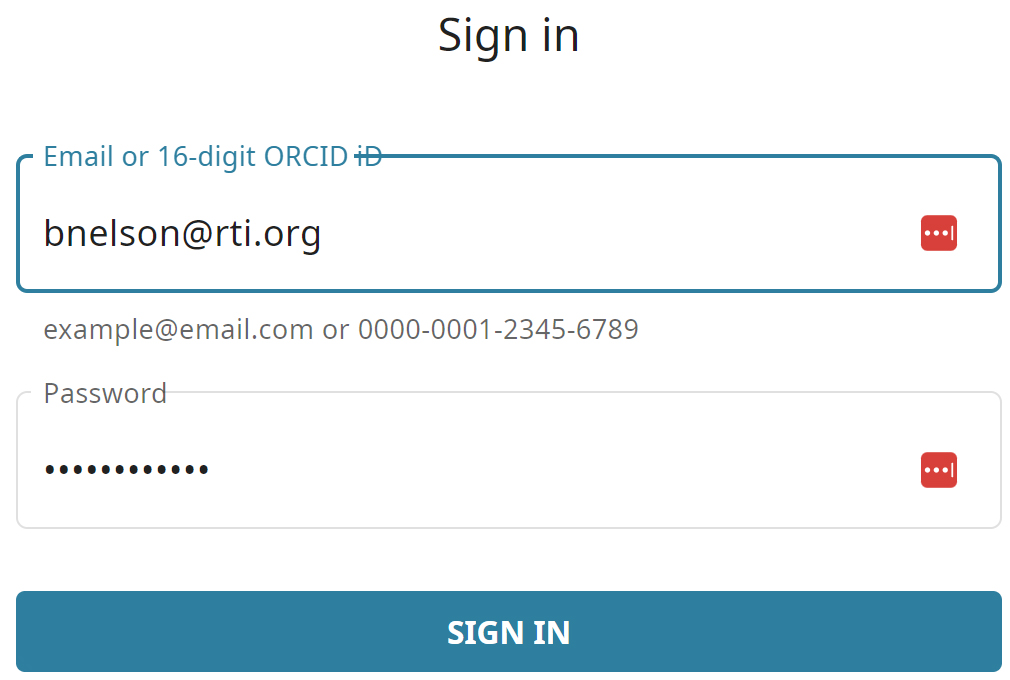
Or register for an ORCID iD account if they don’t already have one:
Once logged in, an ORCID authorization screen appears, asking the researcher to authorize the connection between their ORCID record and RTI:
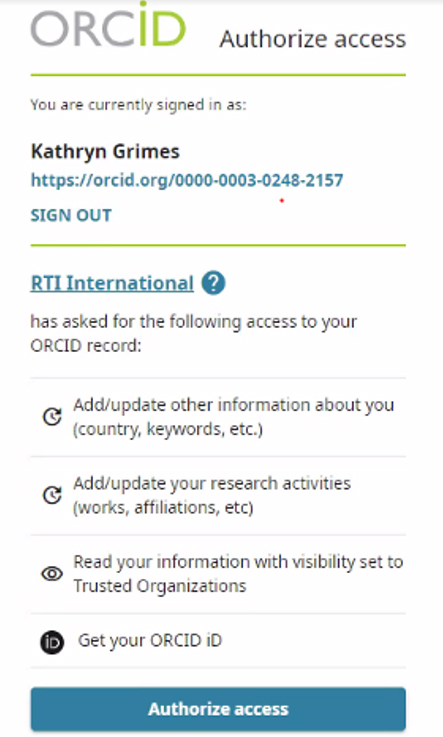
After clicking “authorize access,” the researcher’s ORCID iD appears on their Pure profile:
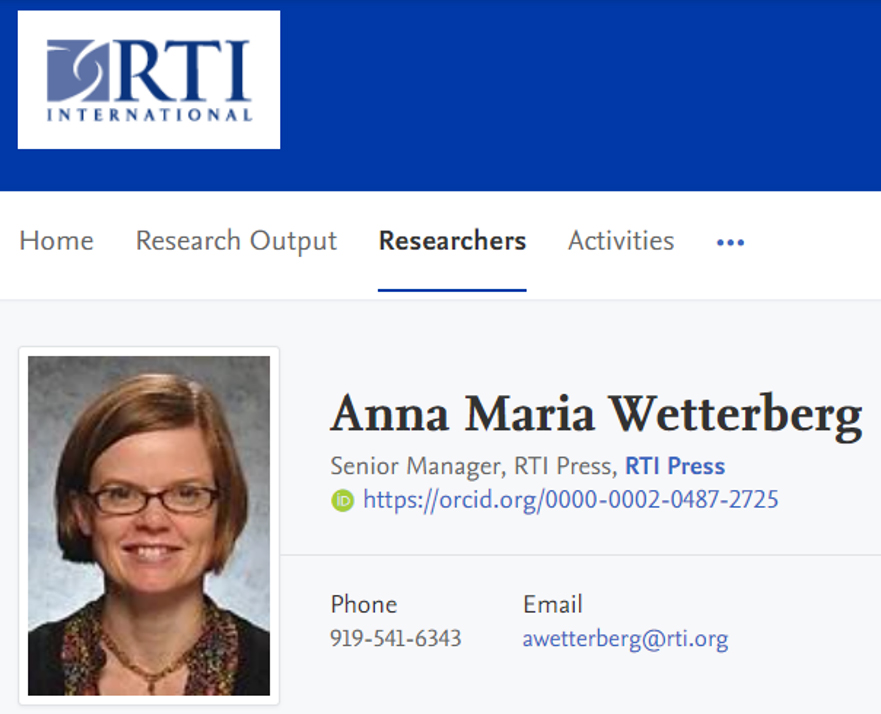
The researcher’s Scopus ID and employment affiliation are written to their ORCID record, with the source appearing as RTI International:
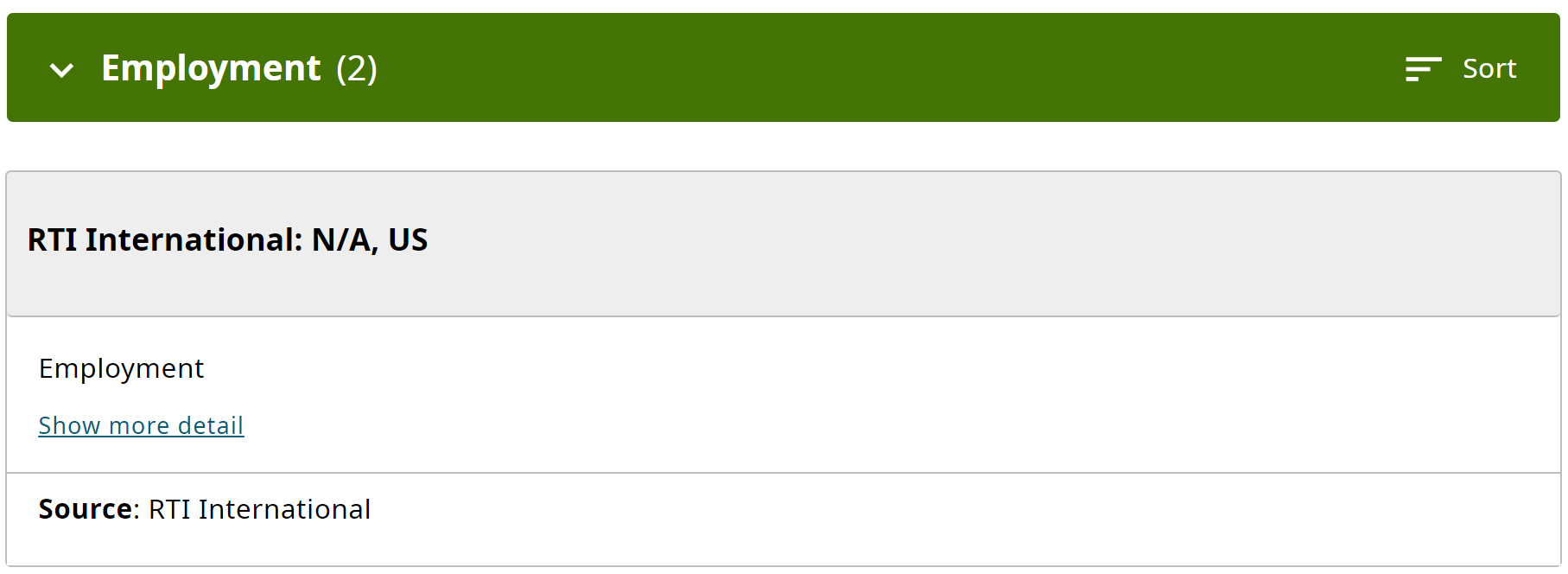
And their works are also exported to ORCID with the source appearing as RTI International:
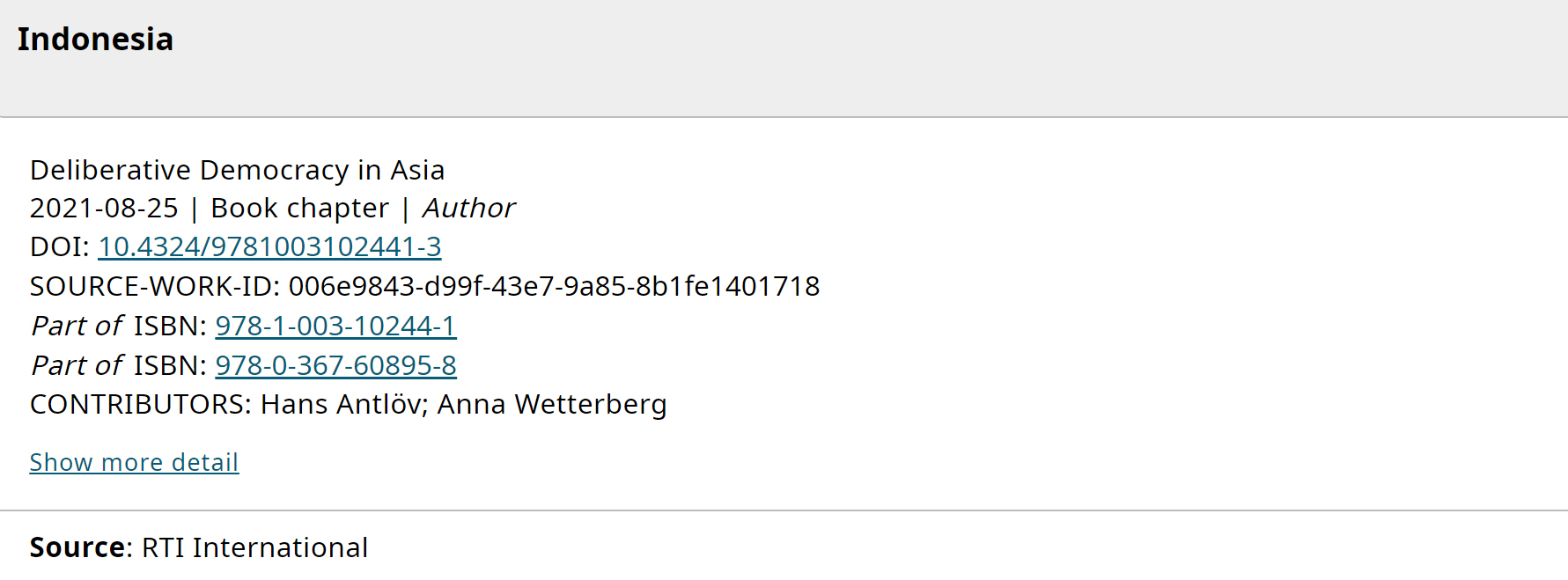
ORCID iDs are also linked from RTI’s public facing expert profile pages:
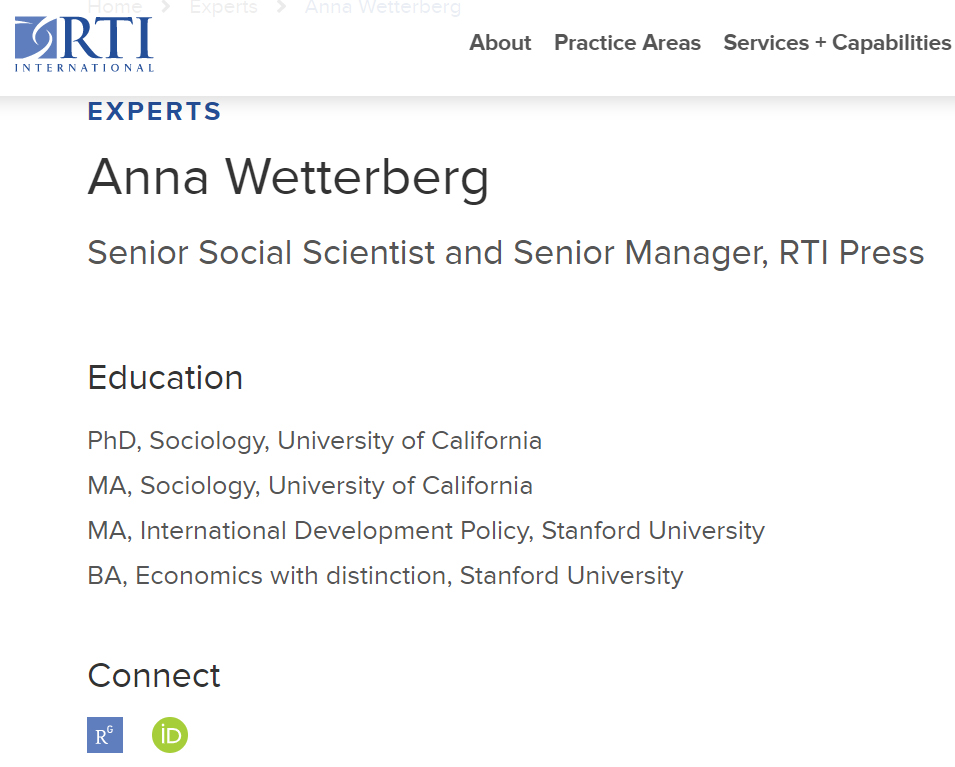
Overall, ORCID adoption efforts at RTI have been a success, and the SSH team has received positive feedback from researchers and staff. For example, one RTI project lead reported that when co-publishing with a government agency client, ORCID iDs were required, and because she had already learned about ORCID from her work at RTI, she was able to help her co-author understand what ORCID was and set up their own account so that the publication could be submitted.
RTI’s SSH staff continue to provide follow-up presentations about ORCID by request at staff meetings, in regular training for researchers, as well as new researcher orientation, on how to take advantage of the benefits of ORCID in Pure. Staff from all business units have participated in ORCID training. RTI also plans to continue promotion of ORCID by encouraging adoption with Author Awards, recommending use of ORCID for RTI Press submissions, incorporating ORCID into other RTI processes and contract proposals, and recruiting ORCID ambassadors across the organization.
For any questions about RTI’s ORCID case study, or how you can use ORCID at your own organization, please contact orcidus@lyrasis.org
